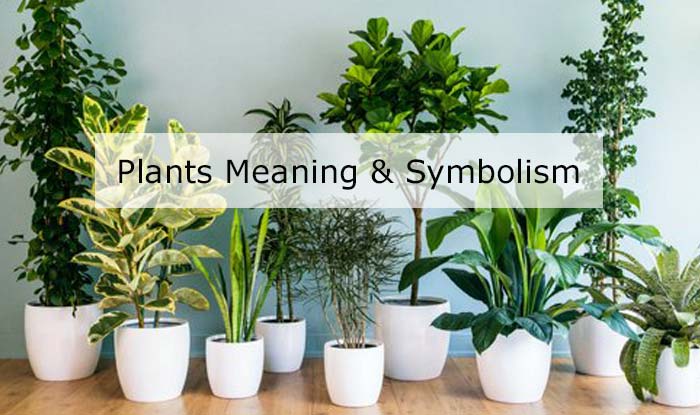Be it about decorating a home or surprising someone you love with a gift symbolizing your love and care, plants have flawlessly blown everyone’s mind with their beauty as well as health benefits. Just like flowers, plants also have a language of their own through which they communicate bundle of emotions and human expressions in an inexplicable manner. Understanding the meaning and symbolism of plants was a tricky job, but not anymore. The language of plants has been successfully decoded and can be now understood in a layman’s language.
Here is the ultimate guide to the meaning and symbolism of plants which gives you an insight about what each plant mean and symbolize. So, before picking a plant to surprise you dear one, you can now choose the most appropriate one for them. Also know how to take care of these amazing plants which are meaningful and interesting in every way.
Let’s read here –Table of Contents
1. Lucky Bamboo (Dracaena Braunii)
Though the meaning of bamboo plant changes depending on the number of stalks, but there is also a universal meaning to this amazing plant which is known as an epitome of good fortune and happiness for the people. A lucky bamboo symbolises renewal, growth, good health, flexibility, and strength. A lucky bamboo plant is a great gift for someone entering a new phase in life.
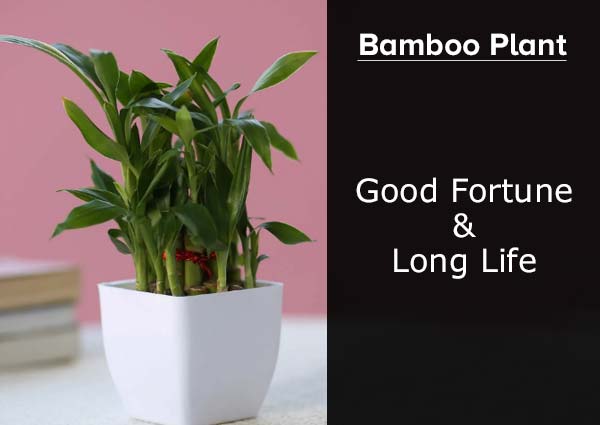
Plant care tips: Ensure that the roots of this plant remain immersed in water. Change water of the pot every week. Keep the plant in indirect sunlight.
2. Peace Lily (Spathiphyllum)
Certainly one of the most popular indoor plants to keep in homes, these lush green beauties are a symbol of peace, hope, and sympathy. These Feng Shui plants hints at the rebirth of the soul and brings auspicious energies in the spaces where they are kept. A beautiful plant of peace lily has glossy leaves and ivory white flowers signifying solitude and purity. Peace lily plant is an ideal choice for a person who has recently someone dear in the family.
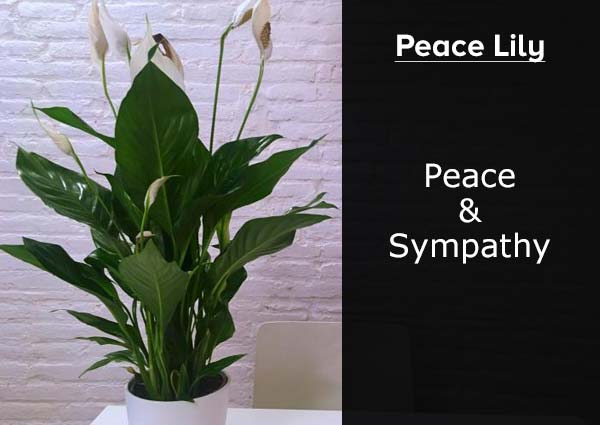
Plant care tips: Keep the soil of this plant moist. Place the plant in bright light and in temperatures more than 55º F.
3. Snake Plant (Sansevieria trifasciata)
Humorously referred to as the “mother-in-law’s tongue”, a snake plant brings good luck in homes if placed in the right direction. The plant is a great air-purifying plant that absorbs harmful pollutants from the indoor air making it suitable for breathing purposes. Moreover, the snake plant eliminates negative energies from a space by releasing positive Chi.
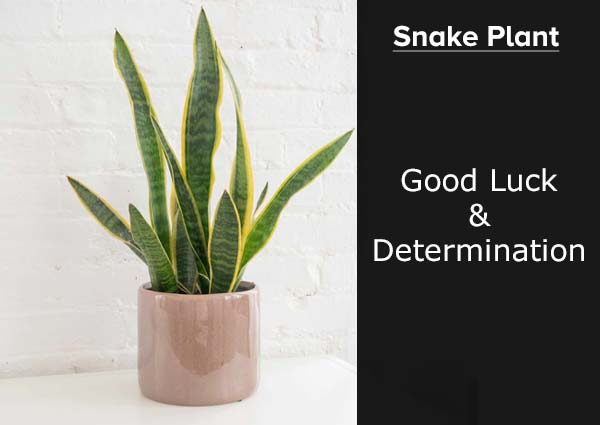
Plant care tips: Keep these low-maintenance plants in indirect sunlight. The ideal temperature for this plant is above 50º F. Avoid making its leaves wet and water only when the soil is dry.
4. Philodendron (Philodendron bipinnatifidum)
A beautiful and lively plant of philodendron stands for the love of nature making it one of the most popular houseplants of today. With a rich history dates back to the 16th century, this indoor plant has amazing air-purifying qualities. This plant is a great gift for the people who have a strong inclination towards eco-friendly living culture or welcoming a new phase in their lives. Philodendron also represents health and abundance.

Plant care tips: Keep the plants in indirect light and only be watered once the soil is half dry.
5. Golden Pothos (Epipremnum aureum)
Golden pathos is a Southeast Asian climbing plant which grows long and promptly with determination. This houseplant represents dedication and relentless attitude to chase one’s dreams. Known as a lucky plant, it is believed that keeping this plant in homes brings good fortune and wealth to the owners. Also called Devil’s Ivy, the plant has the tendency to climb up tress for sunlight covering a large amount of area. Arranging a golden pathos plant in a hanging pot in the balcony will act as a shield against negative energies.
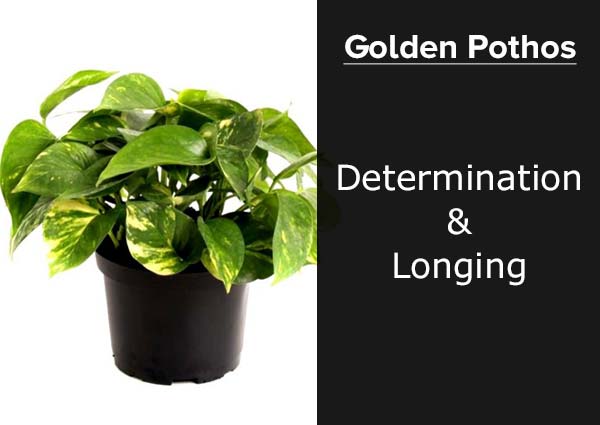
Plant care tips: Pathos plant prefers medium indoor light. Water these plants after the soil is dry in colder months and keep the soil moist in warmer months.
6. Bonsai (Juniperus procumbens)
Bonsai literally means “planted in a container”. Though every variety of bonsai represents different meanings but the common meanings of these plants are peace, harmony, good luck and balance. These artistic indoor trees indicate the struggles of a tree against elements of nature in creating an imitation of admirable attributes of nature. Bonsai plant symbolizes the conservative approach of the Zen Buddhism and motivates to remove mess from our lives.

Plant care tips: Keepbonsai plants in direct sunlight and water this plant once a week. Mist the leaves of the plant for freshness and to remove dirt. Pruning is essential in case of bonsai plants.
7. Spider Plant (Chlorophytum comosum)
A well-known air-purifier plant, spider plant is a champion in eliminating harmful pollutants from the indoor air in homes. Spider plant is efficient in removing the negative energies from homes and promoting Chi energies in it. According to some beliefs, this plant also symbolizes fertility if hanged in the bedroom. Hanging this plant in the kitchen brings abundance and prosperity. This indoor plant serves as a symbol of renewal of connections with others. It is a wonderful plant to give to people who are moving away from home for the first time.
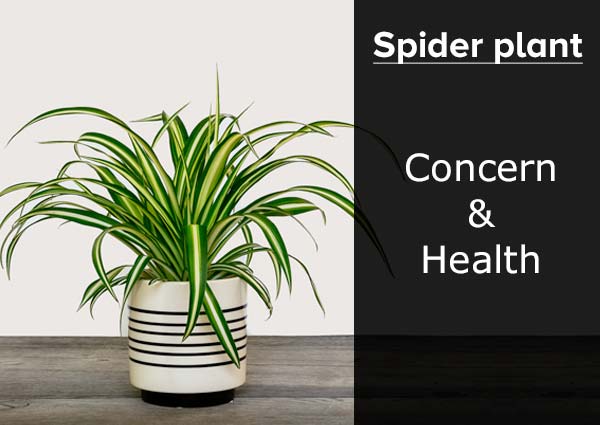
Plant care tips: Put spider plants in indirect sunlight. Do not overwater your plant.
8. Ficus (Ficus microcarpa)
Also known as the Chinese Banyan, this variety of Ficus plants is one of the famous houseplants used in decorating homes. The glossy leaves of the plant give it a shiny appeal. Standing for universal understanding, unity, and knowledge, this plant is also known as a weeping fig. It is a great gift for someone who has leadership qualities as it also symbolizes prosperity and unity.
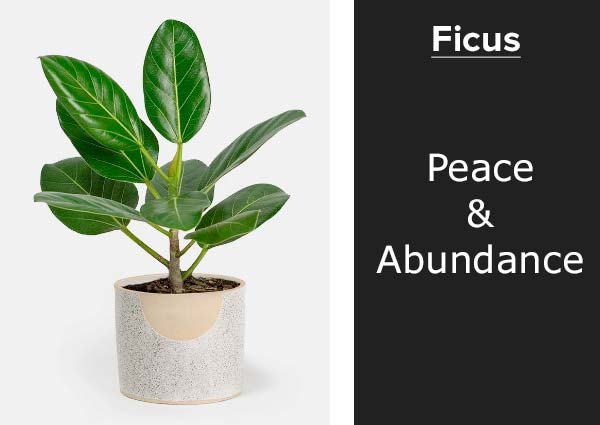
Plant care tips: Indirect sunlight is ideal for the ficus plant. Maintain temperatures above 60º F where this plant is kept. Water this plant weekly and avoid watering it in winter months.
9. Succulents (Sedum morganianum)
According to the language of flowers, succulents symbolize endurance and timeless love as they are strong plants which store water in their leaves to survive in difficult conditions. Succulent plants represent gold and money in Feng Shui. These plants are wonderful gifts for the people who are trustable and always support you.

Plant care tips: These low-maintenance plants should be watered once a week. Keep the soil of this plant wet and not soaked in water. Keep them in sunlight for at least six hours and at temperature of not more than 50º F.
10. Money Tree (Pachira aquatica)
As the name of the plant suggests, a money tree is a symbol of wealth and prosperity. The tree comprises of five leaves from one branch each representing the five elements of Feng Shui – Earth, water, wood, metal and fire. The glossy leaves and the braided trunk of the money tree gives it an appealing touch making it one of the most popular indoor plants to keep in homes. As per the beliefs, the plants stand for good luck, wealth, answered prayers, prosperity, and positive energy. A money tree is a perfect surprise for those who are starting a new career or business.

Plant care tips: The money tree prefers a temperature between 65–75º F. The plant should receive indirect sunlight for some time. Moist soil is essential for this plant in summer months and avoids watering the plant frequently in winter season.
11. Aloe (Aloe vera)
One of the most common houseplants found in every Indian household, aloe vera is a great home remedy to treat multiple health issues. The plant is a symbol of good fortune and positive energies which removes negativities and bad vibes from home. Infused with healing properties, aloe vera plant is the ‘plant of immortality’ popular since many generations. It is a great gift for people interested in holistic health.

Plant care tips: Aloe vera needs bright and indirect sunlight and temperatures between 55–80º F. The plant should be watered in every three weeks and avoid watering it in winter months.
12. Cactus (Cactaceae)
As per the culture of North America, the cactus stands for protection, warmth, and motherly love. As these plants have the ability to survive in harsh climates, they have become a known symbol of maternal love. The plant is an epitome of beauty and uniqueness and stands for longevity as well. Give a cactus to someone who is going through a tough time or determined to achieve their targets.

Plant care tips: Put your cactus in bright light and water them only once a week.
13. Holy Basil (Ocimum tenuiflorum)
Holy Basil plant holds a religious value in the Hindu traditions. Symbolizing love, protection, eternal life, and purification, the plant is imbued with amazing healing and healthy properties. Also known as Tulsi in Hindu religion, this sacred plant is called as “the central sectarian symbol of Hinduism”. In Hinduism, holy basil plant is a symbol of pure love.
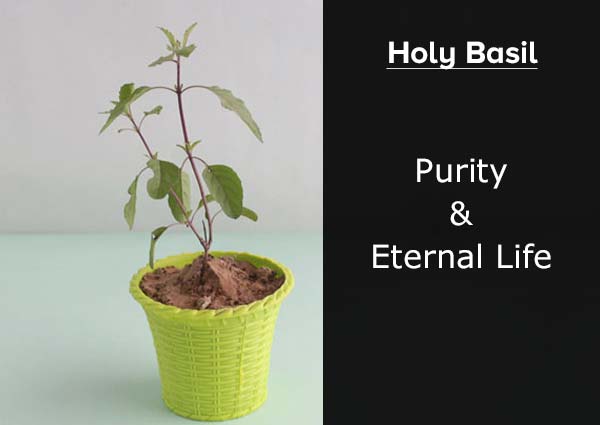
Plant care tips: Keep holy basil plant in indirect sunlight. A well-drained soil is an ideal choice for this plant. Always keep the soil wet but not soaked in water.
14. Jade Plant (Crassula ovate)
Jade plant is a succulent which symbolizes growth, wealth and prosperity and releases positive energies in homes and other spaces. Loaded with air cleansing properties, the jade plant also stands for good fortune and friendship. The coin shaped leaves of this plant makes it a symbol of a bringer of wealth. You can gift this plant to someone who is in the line of business for growth and financial prosperity. Moreover, the jade plant is great indoor plant as it purifies the air within homes and offices to promote good human health.

Plant care tips: Jade plant should be kept in direct sunlight for more than four hours a day. Keep this plant on the south-facing windows. Water this plant frequently to keep its soil moist in summers and lesser in winters.
15. Fern (Adiantum pedatum)
Ferns hold multiple meanings in different regions of the world. Though it universally symbolizes eternal love, this plant stands for new beginnings in life in New Zealand; a hope for future generation in Japan; and sincerity and kindness for Victorians. The plant also stands for confidence, fascination, shelter, and wealth. Gifting ferns to someone means that you wishing the person good luck and a successful new life in future.
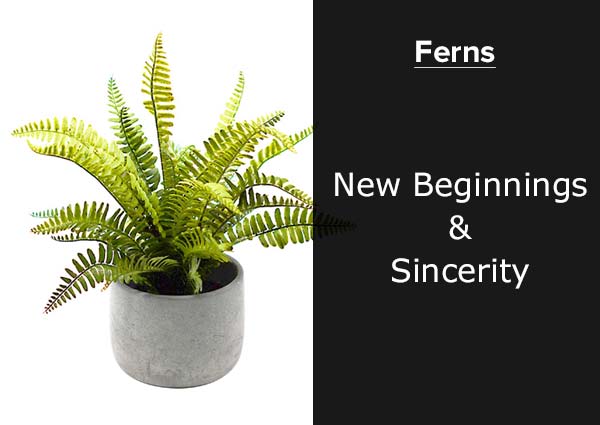
Plant care tips: Regularly water the fern plants to keep their soil moist. Keep these plants in shade or indirect sunlight. A temperature of 65–75ºF is ideal for the fern plant.
The Final Words
Learning the complex languages of plants must have been an intriguing thing for you. The names of the plants listed here must be familiar to you, but you were unaware about their symbolism before. But, now as you have a clear understanding about their meanings, you can clearly say that that you have made the right choice welcoming these plants in your personal spaces. You can order these plants online and elevate the interiors of your home or office in a fascinating manner!

Sakshi Ecavade is our in-house content developer having a good understanding about the gifting industry. She creates quality content surrounding flowers, chocolates, plants, cakes, and other products which makes excellent gifts for the people. Accurate and authentic information is what she tries to deliver through her blogs.

